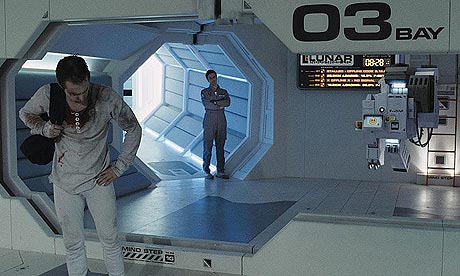Bafta's Carl Foreman award jury must do better
The prize is supposed to reward outstanding work by a first-time British writer, director or producer. However, it's been too focused on directors

Moonbase on a shoestring … Moon
Forget such baubles as best film and best actor - the Bafta that really matters, for people who care about UK cinema, is the one for outstanding debut by a British writer, director or producer.
It's not part of the Oscar race, so it gets overshadowed by the hoopla around the big prizes. But it's the award that says most about the present health and future hopes of British film. Ironically, it's given in honour of an American, the Oscar-winning screenwriter Carl Foreman, who fled Hollywood's blacklist to find sanctuary in Britain.
Foreman was a defiantly independent spirit. That's reflected in a prize which celebrates the passion, the determination, the ambition and the sheer bloody-minded desperation that drives first-time film-makers. The nominees often remark that they don't feel like newcomers, because it has taken such a long hard slog to get to this point.
This year's nominees have all paid their dues in one way or another – Duncan Jones, director of Moon; Sam Taylor-Wood, director ofNowhere Boy; Stuart Hazeldine, writer/director of Exam; Eran Creevy, writer/director of Shifty; and Lucy Bailey, Andrew Thompson, Elizabeth Morgan Hemlock and David Pearson, the directors and producers ofMugabe and the White African.
I served on Bafta's Foreman jury for the previous four years, during which time we gave the prize to Joe Wright, Andrea Arnold, Matt Greenhalgh and Steve McQueen – a pretty impressive rush of new blood to energise British cinema.
There are 50-70 films each year that involve a first-time British writer, director or producer – that's about half of all UK films – and it was a privilege to be forced to watch all of them. They ranged from big studio movies such as Mamma Mia! and Flushed Away to self-financed, self-distributed microbudgeters that got one week's release in one cinema in Wales. Some were excruciating, many showed sparks, and a few were quite brilliant.
But what struck me most was how old many of the debutants were, particularly the best ones. The average age of the nominees is around 40, having come via other careers, often very successful ones – TV, theatre, commercials (such as Jones), fine art (McQueen and Taylor-Wood), or in the case of Arnold, presenting children's TV. This isn't a prize for hot kids fresh out of film school because it generally takes them at least a decade to get their first movie made.
Some might argue that's a bad thing for British cinema, but making films isn't supposed to be easy. It means that first films such as McQueen's Hunger or Arnold's Red Road display a startling creative maturity that gives their makers a real shot at a long and durable career. British film-makers often arrive fully formed. It's worth noting that three of this year's Bafta nominees for outstanding British film – In the Loop, Moon and Nowhere Boy – are also debuts.
One thing about the Foreman bothers me, though. The award is monopolised by directors. Writers and producers barely get a look in. Greenhalgh is the only writer ever to win, for Control, and that was only possible because the film's debut director Anton Corbijn is Dutch and wasn't eligible. Producer Nicola Usborne shared the award with her director Joel Hopkins for Jump Tomorrow, but no other producer has ever won. Again this year, the jury didn't manage to nominate a solo writer or a solo producer.
It's difficult for the jury to see beyond what's up there on the screen, but they need to try harder. This year, they missed an open goal, in the form of Stuart Fenegan, the producer of Moon. Jones did fine work, but Moon is, above all, a remarkable achievement in production. Raising £3m in private finance, piecing together the relationships with the various effects houses and model-makers who created an utterly convincing moonbase on a shoestring, working with Jones and writer Nathan Parker to develop the concept into a script and then into a fully realised vision, negotiating the sale to Sony – if that didn't deserve a Bafta, I don't know what does. But like most first-time producers, Fenegan shared his credit with an experienced mentor, Trudie Styler, and that was enough to rule him out.

No comments:
Post a Comment